Other Physical Measuring Instruments
Showing all 21 results
- Other Physical Measuring Instruments, Physical Measuring Instruments, Testing Instrument & Equipment
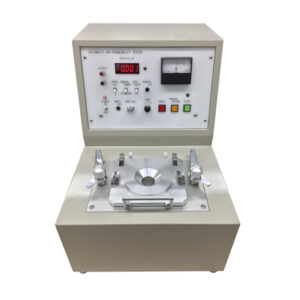
Air Permeability Tester KES-F8 – KATO TECH CO.LTD.
Other Physical Measuring Instruments, Physical Measuring Instruments, Testing Instrument & EquipmentAir Permeability Tester KES-F8 – KATO TECH CO.LTD.
The KES-F8 Air Permeability Tester is designed to quickly and accurately measure the breathability and permeability of a wide range of samples, from those with high permeability, such as stockings, to those with low permeability, such as synthetic leather.
Samples can be mounted in just a few seconds using the handle, and measuring is also incredibly simple.
SKU: n/a - Other Physical Measuring Instruments, Physical Measuring Instruments, Testing Instrument & Equipment

Automatic Vacuum Cooling Characteristic Tester – Iwasaki System Corporation
Other Physical Measuring Instruments, Physical Measuring Instruments, Testing Instrument & EquipmentAutomatic Vacuum Cooling Characteristic Tester – Iwasaki System Corporation
Developing new products with originality, ingenuity and enthusiasm
Measuring device for JIS cooling curve at a given vacuum level
SKU: n/a - Other Physical Measuring Instruments, Physical Measuring Instruments, Testing Instrument & Equipment
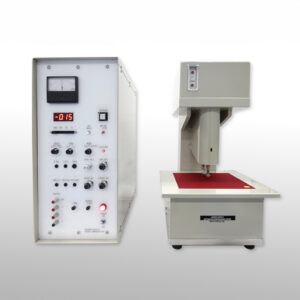
Compression Tester KES-FB3-A – KATO TECH CO.LTD.
Other Physical Measuring Instruments, Physical Measuring Instruments, Testing Instrument & EquipmentCompression Tester KES-FB3-A – KATO TECH CO.LTD.
Compression characteristic data is useful for determining fullness and softness, smoothness, anti-drape stiffness.
The KES-FB3-A Compression Tester analyzes hand movements-particularly, pushing with a finger-performed by artisans and professionals when judging a fabric’s texture. This device performs this movement mechanically, making it possible to obtain objective numerical data.
Obtainable data includes compression rigidity, compression energy, and recoverability for such targets as general fabric, cloth, paper, and non-woven fabric.SKU: n/a - Other Physical Measuring Instruments, Physical Measuring Instruments, Testing Instrument & Equipment
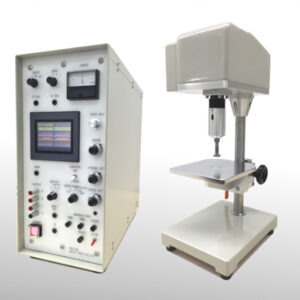
Compression Tester KES-G5 – KATO TECH CO.LTD.
Other Physical Measuring Instruments, Physical Measuring Instruments, Testing Instrument & EquipmentCompression Tester KES-G5 – KATO TECH CO.LTD.
The KES-G5 Compression Tester analyzes hand movements-particularly, movements by finger-performed by artisans and professionals when judging a fabric’s texture.
Obtainable data includes compression rigidity, compression energy, and recoverability.
The machine can be applied to a wide variety of fields and purposes, including determining the softness of disposable diapers and the hardness of mousse.SKU: n/a - Other Physical Measuring Instruments, Physical Measuring Instruments, Testing Instrument & Equipment
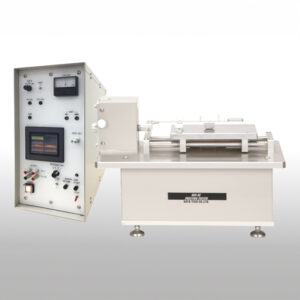
Friction Tester KES-SE – KATO TECH CO.LTD.
Other Physical Measuring Instruments, Physical Measuring Instruments, Testing Instrument & EquipmentFriction Tester KES-SE – KATO TECH CO.LTD.
The KES-SE Friction Tester analyzes hand movements-particularly, strokes-performed by artisans and professionals when judging a fabric’s texture.
The device performs this movement mechanically, making it possible to obtain objective numerical data while offering more enhanced versatility over the KES-FB4-A Surface Tester.
Obtainable data includes average frictional coefficient, and fluctuation of average frictional coefficient. From these characteristic values, the KES-SE evaluates and quantifies smoothness, slipperiness, and roughness felt when actually touching the target in order to provide objective data.SKU: n/a - Other Physical Measuring Instruments, Physical Measuring Instruments, Testing Instrument & Equipment

In-Line Non-Contact Gloss Tester GLS-2060 – MSJ Creative research Laboratory
Other Physical Measuring Instruments, Physical Measuring Instruments, Testing Instrument & EquipmentIn-Line Non-Contact Gloss Tester GLS-2060 – MSJ Creative research Laboratory
Non-contact, real-time measurement and display of change data over time.
As a gloss meter, it can quickly monitor the condition of the production line. All measurement data obtained as a gloss meter are saved for later detailed evaluation and study.
SKU: n/a - Other Physical Measuring Instruments, Physical Measuring Instruments, Testing Instrument & Equipment
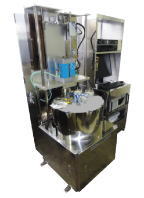
JIS standard testing machine (automatic TYPE hardening) 2station – Iwasaki System Corporation
Other Physical Measuring Instruments, Physical Measuring Instruments, Testing Instrument & EquipmentJIS standard testing machine (automatic TYPE hardening) 2station – Iwasaki System Corporation
Developing new products with originality, ingenuity and enthusiasm
Measuring device of temperature change of thermocouple by silver specimen and alumel for analysis of cooling performance of quenched oil.
SKU: n/a - Other Physical Measuring Instruments, Physical Measuring Instruments, Testing Instrument & Equipment

JIS standard testing machine (automatic TYPE hardening) 6station – Iwasaki System Corporation
Other Physical Measuring Instruments, Physical Measuring Instruments, Testing Instrument & EquipmentJIS standard testing machine (automatic TYPE hardening) 6station – Iwasaki System Corporation
Developing new products with originality, ingenuity and enthusiasm
Measuring device of temperature change of thermocouple by silver specimen and alumel for analysis of cooling performance of quenched oil.
SKU: n/a - Other Physical Measuring Instruments, Physical Measuring Instruments, Testing Instrument & Equipment

Micro machining (micro discharge drilling machine) – Shinyo Seiki Manufacturing Co.
Other Physical Measuring Instruments, Physical Measuring Instruments, Testing Instrument & EquipmentMicro machining (micro discharge drilling machine) – Shinyo Seiki Manufacturing Co.
Precision and meticulousness” that accurately reads the needs of the customer creates a product that is alive and well.
Micro Drilling Machine, the basic machine tool for micromachining
SKU: n/a - Other Physical Measuring Instruments, Physical Measuring Instruments, Testing Instrument & Equipment

Nano-Satellite ShindaiSat – Shinyo Seiki Manufacturing Co.
Other Physical Measuring Instruments, Physical Measuring Instruments, Testing Instrument & EquipmentNano-Satellite ShindaiSat – Shinyo Seiki Manufacturing Co.
The world’s first experimental communications satellite using visible light from light-emitting diodes (LEDs).
Finally, ShindaiSat, a nano-satellite born in Shinshu, Japan, was launched into space from Tanegashima on February 28, 2014, by the H-2A rocket of the Japan Aerospace Exploration Agency (JAXA) in 2013.
SKU: n/a - Other Physical Measuring Instruments, Physical Measuring Instruments, Testing Instrument & Equipment
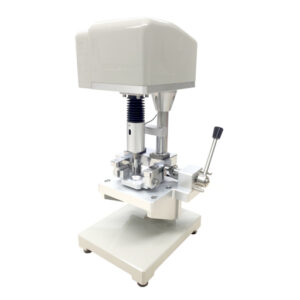
Puncture Strength Tester NDG5 – KATO TECH CO.LTD.
Other Physical Measuring Instruments, Physical Measuring Instruments, Testing Instrument & EquipmentPuncture Strength Tester NDG5 – KATO TECH CO.LTD.
This testing machine measures the piercing strength required for a needle to penetrate a sample.
It is to measure rupture strength by applying force at a right angle, used for testing physical properties of battery separators.
The NDG5 can be used to evaluate the strength of film inside lithium-ion batteries (separators) and to measure the strength required to pierce packaging materials such as food packaging films.SKU: n/a - Other Physical Measuring Instruments, Physical Measuring Instruments, Testing Instrument & Equipment
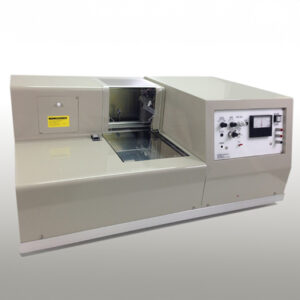
Pure Bending Tester KES-FB2-A – KATO TECH CO.LTD.
Other Physical Measuring Instruments, Physical Measuring Instruments, Testing Instrument & EquipmentPure Bending Tester KES-FB2-A – KATO TECH CO.LTD.
The KES-FB2-A Pure Bending Tester analyzes hand movements-referred to as “bending”-performed by artisans and professionals when judging a fabric’s texture.
Obtainable data includes bending rigidity and recoverability for such targets as general fabric, cloth, paper, non-woven fabric, and film.
Bending characteristic data is useful for determining stiffness and fullness, softness, anti-drape stiffness.SKU: n/a - Other Physical Measuring Instruments, Physical Measuring Instruments, Testing Instrument & Equipment
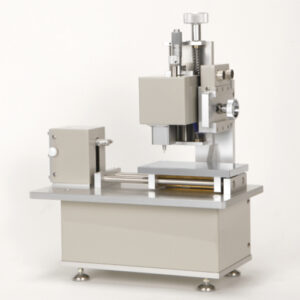
Roughness/Friction Tester KES-SESRU – KATO TECH CO.LTD.
Other Physical Measuring Instruments, Physical Measuring Instruments, Testing Instrument & EquipmentRoughness/Friction Tester KES-SESRU – KATO TECH CO.LTD.
The KES-SESRU Roughness/Friction Tester analyzes hand movements-particularly, strokes-performed by artisans and professionals when judging a fabric’s texture.
In addition to average frictional coefficient and fluctuation of average frictional coefficient, surface roughness data is obtained. The device is also suitable for light texture conditions and hair measurement.
SKU: n/a - Other Physical Measuring Instruments, Physical Measuring Instruments, Testing Instrument & Equipment

Single-acting cooling characteristic tester – Iwasaki System Corporation
Other Physical Measuring Instruments, Physical Measuring Instruments, Testing Instrument & EquipmentSingle-acting cooling characteristic tester – Iwasaki System Corporation
Developing new products with originality, ingenuity and enthusiasm
Measuring device of temperature change of thermocouple by silver specimen and alumel for analysis of cooling performance of quenched oil.
SKU: n/a - Other Physical Measuring Instruments, Physical Measuring Instruments, Testing Instrument & Equipment

Steady-state Thermal Conductivity Measuring Device SS-H40 – BETHEL Co. Ltd.
Other Physical Measuring Instruments, Physical Measuring Instruments, Testing Instrument & EquipmentSteady-state Thermal Conductivity Measuring Device SS-H40 – BETHEL Co. Ltd.
Multifunctional and high-performance “steady-state method” thermal conductivity measuring device
[ Fast measurement ] A measurement that previously took several hours is now 10-20 minutes per measurement !
SKU: n/a - Other Physical Measuring Instruments, Physical Measuring Instruments, Testing Instrument & Equipment
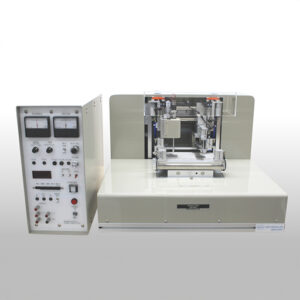
Surface Tester KES-FB4-A – KATO TECH CO.LTD.
Other Physical Measuring Instruments, Physical Measuring Instruments, Testing Instrument & EquipmentSurface Tester KES-FB4-A – KATO TECH CO.LTD.
The KES-FB4-A Surface Tester analyzes finger movements-particularly, strokes-performed by artisans and professionals when judging a fabric’s texture.
Obtainable data includes frictional coefficients, fluctuations of frictional coefficients, and surface roughness for such targets as general fabric, cloth, paper, non-woven fabric, and film. Surface friction and roughness characteristic data is useful for determining fullness and softness, smoothness, crispness.
SKU: n/a - Other Physical Measuring Instruments, Physical Measuring Instruments, Testing Instrument & Equipment
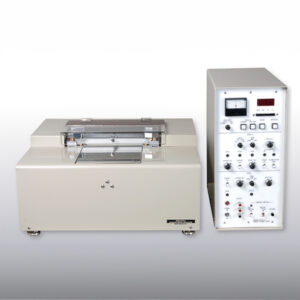
Tensile and Shear Tester KES-FB1-A/AW – KATO TECH CO.LTD.
Other Physical Measuring Instruments, Physical Measuring Instruments, Testing Instrument & EquipmentTensile and Shear Tester KES-FB1-A/AW – KATO TECH CO.LTD.
The KES-FB1-A Tensile and Shear Tester analyzes hand movements-referred to as “tensile” and “shear”-performed by artisans and professionals when judging a fabric’s texture.
This device performs these movements mechanically, making it possible to obtain objective numerical data.
Obtainable data includes tensile/shear rigidity, tensile energy, elongation rates, and recoverability for such targets as cloth, paper, non-woven fabric, and film.
Tensile and shear characteristic data is useful for determining stiffness and anti-drape stiffness. These properties often influence form stability and the tendency for wrinkles.SKU: n/a - Other Physical Measuring Instruments, Physical Measuring Instruments, Testing Instrument & Equipment
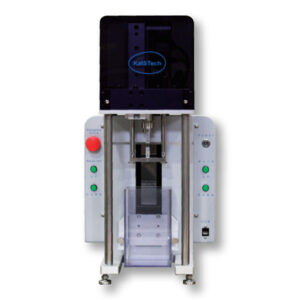
Tensile rupture tester KES-TSSH – KATO TECH CO.LTD.
Other Physical Measuring Instruments, Physical Measuring Instruments, Testing Instrument & EquipmentTensile rupture tester KES-TSSH – KATO TECH CO.LTD.
A testing machine that can measure tensile, stress-relaxation, andrupture characteristics of hair, etc.
Each characteristic can be measured with up to 10 hairs.
It can be applied for various purposes such as the testing of the tensile strength of heat damaged hair or the hair elongation rate before and after shampooing.SKU: n/a - Other Physical Measuring Instruments, Physical Measuring Instruments, Testing Instrument & Equipment
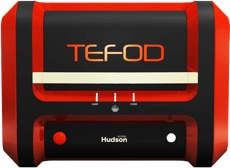
Thermal Evaluation of Fiber Orientation Distribution – BETHEL Co. Ltd.
Other Physical Measuring Instruments, Physical Measuring Instruments, Testing Instrument & EquipmentThermal Evaluation of Fiber Orientation Distribution – BETHEL Co. Ltd.
Quantify fiber orientation and thermal diffusivity at high speed and non-contact!!
A system that visualizes the fiber state inside the sample by “fiber orientation identification method”
SKU: n/a - Other Physical Measuring Instruments, Physical Measuring Instruments, Testing Instrument & Equipment

Thermal Microscope TM3 – BETHEL Co. Ltd.
Are you looking for a Other Physical Measuring Instruments product?
When selecting Other Physical Measuring Instruments for your company’s needs, there are several important points to consider during the comparison and evaluation process.
1. Measurement Accuracy and Precision
Evaluate the measurement accuracy and precision of the other physical measuring instrument. Look for instruments that provide reliable and accurate measurements of the desired physical parameters. Consider the instrument’s resolution, sensitivity, and calibration capabilities to ensure accurate and precise measurements.
2. Measurement Range
Consider the measurement range of the other physical measuring instrument. Ensure that it covers the full range of values you need to measure in your application. It’s important to choose an instrument that can handle the broadest range possible to accommodate variations in the physical properties being measured.
3. Measurement Technique
Evaluate the measurement technique employed by the other physical measuring instrument. Different instruments may use techniques such as pressure sensing, force measurement, displacement sensing, or temperature sensing. Understand the principles and capabilities of each technique and choose the one most suitable for your measurement requirements.
4. Sample Compatibility
Assess the compatibility of the other physical measuring instrument with your sample types. Consider factors such as sample size, shape, and material properties. Ensure that the instrument can effectively measure the physical properties of your samples without causing damage or altering their characteristics.
5. Calibration and Maintenance
Assess the calibration requirements and maintenance procedures of the other physical measuring instrument. Look for instruments that offer easy calibration processes and provide reliable calibration standards. Consider the frequency and complexity of maintenance tasks to ensure accurate and reliable measurements over time.
